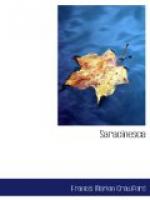Upon that spot Corona d’Astrardente knelt down reverently and prayed,—prayed that she might be forgiven for all her shortcomings to the dear dead man; that she might have strength to bear her sorrow and to honour his memory; above all, that his soul might rest in peace and find forgiveness, and that he might know that she had been truly innocent—she prayed for that too, for she had a dreadful doubt. But surely he knew all now: how she had striven to be loyal, and how truly—yes, how truly—she mourned his death.
At last she rose to her feet, and lingered still a moment, her hands clasped as they had been in her prayer. Glancing down, something glistened on the carpet. She stooped and picked it up. It was her husband’s sealring, engraven with the ancient arms of the Astrardente. She looked long at the jewel, and then put it upon her finger.
“God give me grace to honour his memory as he would have me honour it,” she said, solemnly.
Truly, she had deserved the love the poor old dandy had so deeply felt for her.
CHAPTER XVII.
That night Giovanni insisted on going out. His wounds no longer pained him, he said; there was no danger whatever, and he was tired of staying at home. But he would dine with his father as usual. He loved his father’s company, and when the two omitted to quarrel over trifles they were very congenial. To tell the truth, the differences between them arose generally from the petulant quickness of the Prince; for in his son his own irascible character was joined with the melancholy gravity which Giovanni inherited from his mother, and in virtue of which, being taciturn, he was sometimes thought long-suffering.
As usual, they sat opposite each other, and the ancient butler Pasquale served them. As the man deposited Giovanni’s soup before him, he spoke. A certain liberty was always granted to Pasquale; Italian servants are members of the family, even in princely houses. Never assuming that confidence implies familiarity, they enjoy the one without ever approaching the latter. Nevertheless it was very rarely that Pasquale spoke to his masters when they were at table.
“I beg your Excellencies’ pardon—” he began, as he put down the soup-plate.
“Well, Pasquale?” asked old Saracinesca, looking sharply at the old servant from under his heavy brows.
“Have your Excellencies heard the news?”
“What news? No,” returned the Prince.
“The Duca d’Astrardente—”
“Well, what of him?”
“Is dead.”
“Dead!” repeated Giovanni in a loud voice, that echoed to the vaulted roof of the dining-room.
“It is not true,” said old Saracinesca; “I saw him in the street this morning.”
“Nevertheless, your Excellency,” replied Pasquale, “it is quite true. The gates of the palace were already draped with black before the Ave Maria this evening; and the porter, who is a nephew of mine, had crepe upon his hat and arm. He told me that the Duca fell down dead of a stroke in the Signora Duchessa’s room at half-past twelve to-day.”




